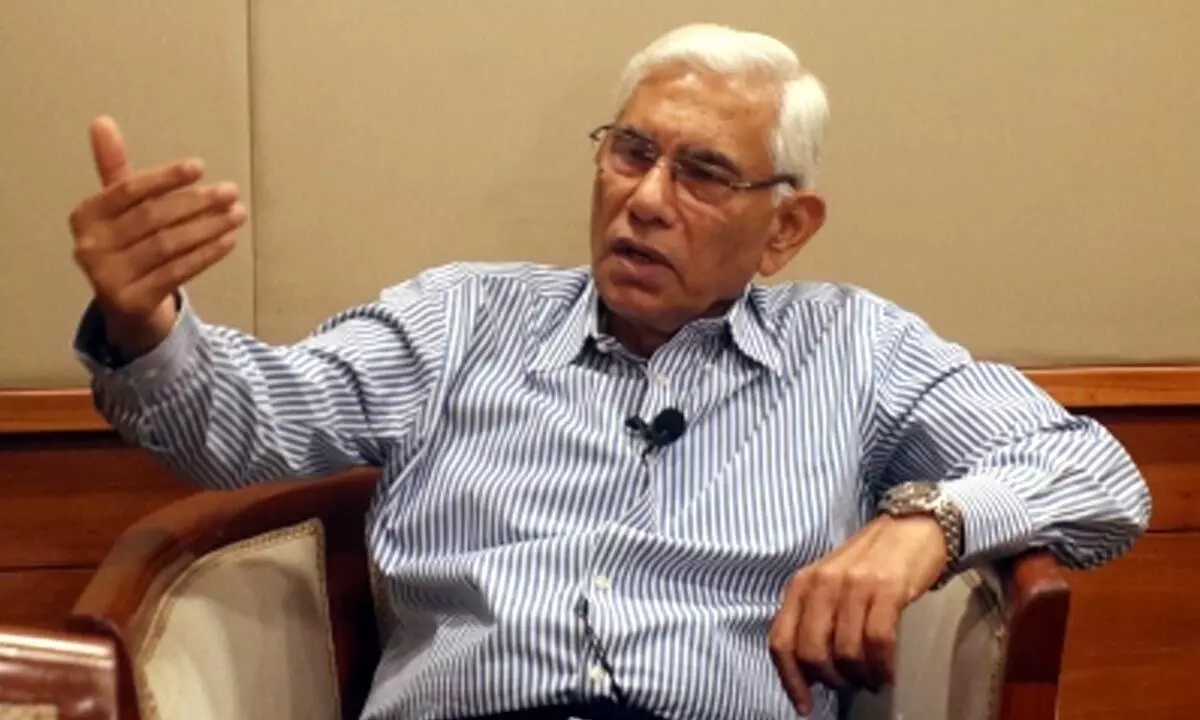Live
- India's coal production posts 5.3 per cent growth to 97.94 million tonnes in Dec 2024
- When you're captain, you probably get a little bit more leeway as well, says Clarke on Rohit
- Gautam Gambhir's Position as India Head Coach in Jeopardy Amidst Team's Downward Spiral
- Lankan President launches 'Clean Sri Lanka' initiative to heal environment and society
- Pushpa 2 Box Office Collection Day 27: Allu Arjun & Rashmika Mandanna's Film Crosses Rs 1000 Crore Worldwide
- Chess rankings: Erigaisi 4th, Gukesh 5th as nine Indians ranked in top-50 in Open section
- Hyderabad to Get Extended Metro Rail: CM Approves Expansion to Medchal and Shamirpet
- Punjab Vigilance Bureau held 173 on bribery charge in 2024: Top official
- New Orleans Truck Rams Into Crowd, 10 Killed and 30 Injured in Deadly Incident
- Haryana CM hails farmer-friendly decisions by first Union Cabinet of 2025
Just In
I am content that we brought a player-centric approach to BCCI: Vinod Rai


Former Comptroller and Auditor General of India (CAG), Vinod Rai (Photo/IANS)
Former Comptroller and Auditor General of India (CAG), Vinod Rai confesses that there was no 'plan' to write
New Delhi: Former Comptroller and Auditor General of India (CAG), Vinod Rai confesses that there was no 'plan' to write
'Not Just a Nightwatchman: My Innings in the BCCI'(Rupa Publications), which hit the stands recently.
Rai, who was appointed as the Head of the Supreme Court-mandated Committee of Administrators(CoA) to oversee the administration of the BCCI on January 30, 2017, tells IANS that several people told him that considering the fact that his experience at BCCI was much different from any other officer there, the same warranted a book.
"Everybody else had come through an election process while we had been helicoptered into the BCCI. There was so much talk about how we conducted things there, so I thought it made sense to the cricket-loving population to know about how the BCCI works and the kind of changes we tried to bring about -- and yes, why it took us so long to do it," he says.
Stressing that he looks back at his years at BCCI with a sense of total content as they were able to implement the orders of the court, bring about total transparency and ensure a player-centric approach, the author adds, "The cricketing body surely lacked a player-centric approach and we were able to reverse that in terms of compensation packages, workload and gaps between tournaments among other things. Of course, bringing about all these changes took much longer than I expected."
Rai, who has stressed in the book the need to give a chance to younger people in administrator positions, feels that everyone has a shelf life.
"Why should I believe that I should serve interminably in a government position. I sincerely believe that my successor, who will be younger will be more connected with the going-on in the government. Similarly, I feel that in the world of cricket administration. And look at the players on the ground -- didn't MS Dhoni give way to Virat Kohli, and now we have Rohit Sharma, and he will give way to someone else," says the former CAG, who also wrote 'Not Just an Accountant: The Diary of the Nations Conscience Keeper' (Rupa Publications).
The author does not really blame the media for still talking about the Kohli-Kumble controversy despite the fact that he has cleared the position several times.
"There is a section of the public who would like to believe that the CoA did a bad job, which is fair enough. People are free to have their opinions, no? In the book, I have mentioned the situation we were in. I wonder why those who say that we messed up with the Kumble issue cannot explain the reason his (Kumble's) contract was only for a year and why it did not have an extension clause."
Adding that it is difficult for the administrators to ensure that there is total camaraderie in the dressing room, he says that it is dependent on the team management which comprises the team manager, the coach, other coaches, the captain and team members who can ensure an environment where everyone is willing to give something to take something.
"So everyone must have rounded ends. No angularities. Because they are under high-pressure situations and quite often it has happened, that these angularities emerge and some dissonance comes."
Rai, who has dedicated the book to the players, says that BCCI is one of the richest sports bodies in the world because those athletes play a game that people across the world appreciate, and thus the media covers it.
"That is the reason why endorsements are given. Why is it that the Pakistan Cricket Board does not have the same situation? That is because our 11 athletes are much sought out all over the globe -- precisely why BCCI becomes rich."
"So, should we not have a player-centric approach? Should those on the field not be the central focus of the administration of the BCCI? On one side, there are players and on the other, the cricket-loving population. The board's job is to ensure that the game is played such that the cricket-loving public enjoys it and it totally undiluted. Players need to be given the facilitation they deserve."
Impressed by the evolution of the Indian Women's cricket team over the years, Rai believes that they have a lot in store and their potential is huge.
"They have not been given the space that they deserve yet. However, the BCCI is helping with the requirements of these girls and I feel over the next three years they will emerge at the top in the global community," concludes this Distinguished Visiting Research Fellow at the National University of Singapore.

© 2024 Hyderabad Media House Limited/The Hans India. All rights reserved. Powered by hocalwire.com






